 December 25, 2009 - The report, titled "The Global Adult Tobacco Survey (GATS) Bangladesh Report-2009" showed a total of 41.3 million people in the South Asian country are now in the habit of using tobacco -- either in the form of smoking or chewing.
December 25, 2009 - The report, titled "The Global Adult Tobacco Survey (GATS) Bangladesh Report-2009" showed a total of 41.3 million people in the South Asian country are now in the habit of using tobacco -- either in the form of smoking or chewing.
Official Complete Survey Results - GATS: Fact Sheet: Bangladesh: 2009.."
According to the study, which was conducted on 11,200 households by the World Health Organization (WHO) in association with the Bangladeshi government, 58 percent of the respondents are male and 28.7 percent are female. The prevalence of tobacco use in rural areas is 45.1 percent and 38.1 percent in urban area, it said.
The report also revealed an estimated 1 percent of the national income in terms of gross domestic product (GDP) is spent on purchase of cigarettes and 0.4 percent on bidis (a kind of locally manufactured tobacco).
"Overall economic loss due to tobacco use is very high in fact, "Bangladeshi Health Minister AFM Ruhal Haque was quoted as saying at the launching ceremony of the report on Tuesday.
Use of tobacco is directly linked to health and it is responsible for different non-communicable diseases, he said, adding that the previous report of the WHO in 2004 revealed that around 57,000 people died every year in the country due to the diseases related to tobacco.
The minister said the government is considering making it mandatory to print pictorial health warnings on the packets of cigarettes.
The government recently includes the messages of harmful affects of tobacco in school textbook curriculum to raise awareness of the society.
According to the report, imposing additional taxes on tobacco production, amendment to the Tobacco Control Act and its implementation, anti-smoking media messages and pictorial health warnings on all tobacco products were recommended following the study.
References: Tobacco use on rise despite law Goes up to 43pc from 37pc in 2004, says WHO study, Staff Correspondent, The Daily Star, 12/23/2009; Tobacco use among adults in Bangladesh reaches 43.3 pct, Source: iStockAnalyst, 12/23/2009.
Related news brief:
Bangladesh - FCTC overtaxation hurts tobacco industry country depends on..;
Bangladeshi government will increase taxes on tobacco products..;
Marlboro to be Marketed in Bangladesh - One of the Poorest and Densely Populated Countries in the World..
Read more...
Bringing the World of Tobacco Control closer together..
Bangladesh - GATS - tobacco use among adults reaches 43.3 percent..
PMI - proposed Japanese tobacco tax increase..

December 25, 2009 - NEW YORK (TheStreet) -- Philip Morris International(PMI) shouldn't be too negatively affected by Japan's proposal to raise taxes on tobaccco [tobacco], according to Stifel Nicolaus.
Directly related news brief: Japan Tobacco - reacts angrily to governments decision to raise cigarette tax..
The proposed legislation includes a tax increase of 70 yen (76 cents) per pack and is accompanied by a 5 yen per cigarette or 100 yen per pack increase in the market, writes Stifel Nicolaus in a note.
If the legislation goes through and the full price of 100 yen per pack of cigarettes is enacted, prices of PMI's Marlboro cigarettes could rise by about 30% to 430 yen from the current price of 330 yen in Japan.
At first glance, all this would seem worrying to PMI, especially given the rigorous channels that tobacco companies have to go through in order to raise prices in Japan and compensate for any demand shortfall.
"Japan has been missing one key element found in nearly every other major market around the world -- pricing," the analysts wrote. "The robust decline in this market due to the aging population and lower incidence of smoking has not been met with the usual profitable scenario we find in other markets (France, Germany, U.K., etc.), where pricing goes up to more than make up for the decline in volume."
"Japan is a bit stickier in this instance because the Ministry of Finance has to approve price increases."
Reference: Philip Morris Faces Japan Tax on Tobacc by Andrea Tse, The Street.com, 12/23/2009.
Read more...
Reynolds American - executive interview, Thomas Adams, Vice President And CFO..

December 25, 2009 - Executive Interview: Reynolds American, Inc. - Thomas Adams, Vice President And CFO
Wall Street Transcript has just published Food, Beverages and Tobacco Report. One of those reporting was Thomas Adams, Vice President and CFO, Reynolds American, Inc. Read more...
Serbia - government abandons plans to introduce a blanket ban on smoking indoors..
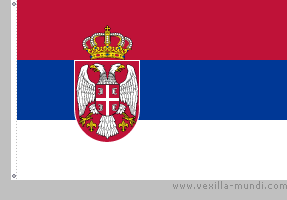
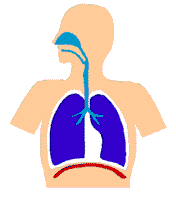
December 25, 2009 - Danas (daily newspaper published in Serbia) says that this decision came after government officials held a meeting with cigarette manufacturers in Serbia.
Tobacco contributes significantly to the burden of disease in Serbia, and it has one of the highest age standardized lung cancer incidence rates in Europe.
The government has agreed to the “protection instead of ban” principle, promoted by cigarette makers and restaurants, the newspaper learned from a source close to the Cevtković cabinet. According to this report, the meeting was held between Ministers of Health and Economy Tomica Milosavljević and Mlađan Dinkić and representatives of cigarette manufacturers last week.
More details from the meeting have not been made public since the participants agreed to keep silent, "but the solution will be presented in several days". When asked to comment on the news, a surprised Milosavljević told the newspaper's reporters, “Why are you asking me about this now? The law is in procedure and I have nothing to add."
The tobacco industry representatives have not been more forthcoming either. The newspaper says they have been pressuring journalists during the past few months and offered to make statements condemning the preparation of the law, but chose to remain silent now.
One of the dilemmas, the article says, is whether the government chose this move as compensation for a violation of the so-called gentlemen's agreements made with tobacco companies when the domestic factories were privatized.
The new owners were promised "protection" until the factories they bought were “back on their feet”.
The tobacco companies have, however, lost that "protection" due to obligations which Serbia assumed as it joined CEFTA, the regional free trade agreement. There has been public speculation that some of the international companies considered leaving Serbia because of this.
Now, the newspaper says, "it is assumed that a blanked ban on smoking ban would perhaps represent one measure too many".
The draft law to regulate smoking in public places was finished in October 2009, but has not been adopted by the government yet. It entered the procedure about a month ago, but was then suddenly withdrawn.
Reference: "Govt. gives up on blanket smoking ban", Source: Danas, 12/24/2009.
Related news brief: PMI - lays off more than 300 workers in Serbia..
Read more...
Macedonia - ban on smoking in public places takes effect on January 1, 2010..

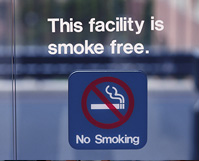 December 25, 2009 - A ban on smoking in public places takes effect in Macedonia at the stroke of New Year, but some members of parliament (MPs) and the hospitality industry are fighting a last-ditch battle.
December 25, 2009 - A ban on smoking in public places takes effect in Macedonia at the stroke of New Year, but some members of parliament (MPs) and the hospitality industry are fighting a last-ditch battle.
Like most European Union and candidate EU states, Macedonia has announced restrictions on smoking, but those who oppose the ban are citing precedents in other countries that have eased such bans.
In September 2009, Croatia eased restrictions, while subsequently Greece and Serbia reportedly were considering doing the same. In some countries, notably Bulgaria, the existing restrictions on smoking in public places are widely ignored – though, ironically, the Government in Sofia has announced that the ban will be widened in 2010.
Previous news brief: (November 11, 2009 - Macedonia has become the latest country in South Eastern Europe to announce a ban on smoking in restaurants and bars, and the latest to hear vociferous complaints from restaurant owners that their businesses will be ruined.>
Macedonia Radio and Television said on December 25 2009 that state inspectors had been dispatched to tell the owners of cafés and eateries that the smoking ban must be complied with in the first minutes of 2010, shortly after people finish wishing each other a happy new year. "State Inspectorate crews will be working overtime during the New Year's holidays, including the New Year's Night, Saso Jakimovski, the head of the state market inspectorate, was quoted as saying. The fine for places found in breach of the smoking ban is set at 2500 euro (3,595.25 USD) to 4000 euro (5,752.40 USD), while individuals will be fined 150 euro (215.72 USD) to 300 euro (431.43 USD).
However, Macedonia’s Dnevnik newspaper said that a group of MPs, led by Georgi Oroshavets and former prime minister Vlado Bucovski, was preparing an attempt to trim back the anti-smoking regulations before the end of January. According to a report by Bulgarian news agency Focus, quoting Dnevnik, Bucovski said that Macedonians could not become "bigger Catholics that the Pope" and there was no need for Macedonia to have such a restrictive law, when – he said – there was a trend throughout Europe towards "loosening" the ban.
Retreats from smoking bans were being ordered because of the bans’ impacts on hotels and the restaurants, Buckovski said. Media in Skopje reported Donco Tanevski, the Chairman of Hotel Association of Macedonia, as saying that the smoking ban will additionally hit tourism workers.
From Belgrade, Danas reported on December 24 2009 that the Serbian government had "abandoned" plans for a blanket ban on smoking indoors. The daily said that this had followed a meeting between government officials and cigarette manufacturers in Serbia.
The government has agreed to the "protection instead of ban" principle, promoted by cigarette makers and restaurants, Danas quoted a source close to the Cevtković cabinet as saying.
In Greece in November, health minister Mariliza Xenogiannakopoulou said that there were "great gaps in the application of the smoking ban" because many establishments were simply not complying. Athens-based daily Kathimerini reported that at the time that Greek officials said that they would launch a review of the law, which was approved earlier in 2009 following complaints from non-smokers at home and pressure from the European Union.
References: Smoking controversies in Macedonia, Serbiaby Clive Leviev-Sawyer, the Sofia Echo, 12/25/2009; Smoking ban effective on New Year's Eve, Macedonian Radio and Televsion, 12/25/2009.
Read more...
Singapore - e-cigarettes are illegal..


December 24, 2009 - In Singapore the import and sale of e-cigarettes is illegal because under anti-smoking laws, anything that resembles a tobacco product cannot be imported, sold, or offered for sale. If convicted, a person can be fined up to 5,000 Singapore dollars (3,496 U.S. dollars). Health Sciences Authority (HSA): there is no smoke and no fire but an e-cigarette is still a cigarette.
So far this year HSA has evicted 13 people for bringing in and selling the much-hyped e-cigarette, local media reported on Wednesday, December 23. Among the 13 individuals investigated are four local suppliers who set up websites to hawk the product. The other nine ordered the device online from overseas suppliers, local newspaper. Last year's numbers are unavailable as cases started appearing late last year.
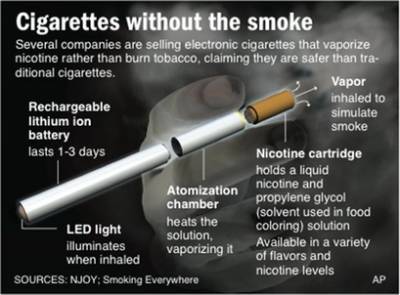 Touted as a "healthy" way to beat rising cigarette prices and a widening ban on smoking here, the electronic cigarette comprises a cartridge of liquid nicotine inserted into a battery-operated steel tube. A heating coil vaporizes the nicotine into a fine mist, which is then inhaled.
Touted as a "healthy" way to beat rising cigarette prices and a widening ban on smoking here, the electronic cigarette comprises a cartridge of liquid nicotine inserted into a battery-operated steel tube. A heating coil vaporizes the nicotine into a fine mist, which is then inhaled.With e-cigarettes there are many flavored cartridges to choose from such as cherry and strawberry. Do you want your child to be a nicotine addict for the rest of their lives??
References: 13 people warned or fined over e-cigarettes in Singapore, Editor: Lin Zhi , ChinaView.cn, 12/23/2009; 13 warned, fined over e-cigs by Teh Joo Lin, The Straits Times, 12/23/2009.
Singapore - some related news briefs: Singapore - record number of smuggling attemps for 1st part of 2009..;
Singapore - new measures to discourage smoking among the young..;
Singapore - more people were smoking in 2007 than 2004..;
Singapore - Smoking increase despite public ban, price hike..; Singapore - Introduction of Tobacco Stamp to combat contraband...
Read more...
Star Scientifiic denied new trial in patent infringement - files appeal..

December 23, 2009 - A federal judge in Maryland has denied Star Scientific Inc.'s request for a new trial after the company lost a patent infringement case against R.J. Reynolds Tobacco Co.
Star has now filed a notice of appeal, which was filed in the US District Court for Maryland, states that Star is appealing to the US Court of Appeals for the Federal Circuit the judgment, orders and decisions specified in the notice, including the judgment resulting from the June, 2009 jury verdict in favor of RJR. (Notice of Appeal Filed by Star Scientific in Patent Infringement Lawsuit, RedOrbit, 12/23/2009.)Star filed the lawsuit in 2001 against Winston-Salem, N.C.-based Reynolds, the nation's second largest tobacco company. The lawsuit claimed that Reynolds had infringed Star's patents for a process designed to reduce some cancer-causing constituents in cured tobacco leaf. Reynolds countered that Star's patents should not have been granted. (Star Scientific Inc. Files Suit Against R.J. Reynolds to Enforce Patent for Curing Tobacco to Substantially Prevent the Formation of Cancer-causing Tobacco Specific Nitrosamines - TSNAs, FindArticles.com - Business Services Industry, 5/24/2001)
The U.S. Patent and Trademark office also is re-examining the patents at Reynolds' request. Pending the outcome of the patent review and the appeal, U.S. District Court Judge Marvin J. Garbis stayed a decision on whether Star should pay attorneys fees and other costs that Reynolds incurred as a result of the lawsuit.
In March 2009, the Supreme Court refused to hear the case, clearing the way for the trial that led to Tuesday's verdict in U.S. District Court in the Northern Division of Maryland.
A federal jury ruled on June 2009 that RJ Reynolds Tobacco Co. did not infringe on two patents claimed by Star Scientific for a tobacco-curing method. Star Scientific shares lost nearly 80 percent of their value in late trading. (UPDATE 3-Star Scientific loses Reynolds U.S. patent dispute, Reuters, 6/16/2009)
Reference: Judges denies new trial for Star Scientific, Staff Reports, Richmond Times-Dispatch, 12/23/2009.
Some related Star Scientific news briefs:
Star Scientific - NASDAQ trading symbol changed to CIGX..;
Star Scientific - new product (in 2010) to help adult smokers maintain a nicotine-free metabolism..;
Star Scientific - will use its low-nitrosamine tobacco curing process to formulate smokeless tobacco dissolvable smokeless products..
Star Scientific - q2 2009 report..;
Star Scientific - Filing patent for zero-nitrosamine tobacco curing process..;
Star Scientific - 2008 annual report/Stonewall vs other OTC NRTs..;
Star Scientific Corporate Study Stonewall Lozenge in NRT..;
Star Scientific Files Third Quarter Financial Report..;
Star Scientific wants to augment sales of their tobacco lozenges..;
Star Scientific , second quarter 2008, sales down 23.6%..;
Star Scientific Applauds Recent State Legislation - Banning Smoking in Cars with Children..
Read more...
India - government set to ban foreign direct investment in tobacco..
 December 23, 2009 - The government is all set to accept the recommendations of a ministerial group and ban foreign direct investment (FDI) in tobacco, dealing a blow to the plans of international tobacco firms that have long eyed a bigger presence in the Indian market, e.g., Japan Tobacco International’s (JTIL) proposal to raise stake in its Indian venture to 74% from 50% now.
December 23, 2009 - The government is all set to accept the recommendations of a ministerial group and ban foreign direct investment (FDI) in tobacco, dealing a blow to the plans of international tobacco firms that have long eyed a bigger presence in the Indian market, e.g., Japan Tobacco International’s (JTIL) proposal to raise stake in its Indian venture to 74% from 50% now.
A decision to ban FDI will draw a line under a long-running issue that has seen hectic lobbying from domestic and foreign players, and will be victory for the health ministry, which had sought a total FDI ban in tobacco. While the government does not allow creation of fresh cigarette manufacture capacity, the current policy lacked clarity on whether FDI is allowed in this sector. The policy had come under attack from various quarters, especially the health ministry.
JTIL, the third-largest manufacturer of cigarettes in the world and the owner of brands such as Camel, Winston, Gold Coast and Salem, had sought the Foreign Investment Promotion Board’s (FIPB) permission to raise its stake in its Indian unit — JTI India — in July and October last year and again in January this year. The company had argued that its proposal was to buy out the shares of the Thakkar family, its Indian partner, and not invest in fresh capacity. When the proposal came up for consideration in January this year, the DIPP deferred a decision on the company’s application, saying it needed more time to finalise the FDI policy for the tobacco sector. In June 2007 JTI Launched WINSTON cigarettes in India.
Foreign tobacco giants have long lobbied for greater FDI in the sector, although local tobacco firms have opposed it.
The move by JTI India comes against the background of strong objections by domestic tobacco companies that forced the government to reject proposals by international tobacco majors like Philip Morris, Rothmans and British American Tobacco (BAT) to set up subsidiaries to sell their tobacco brands. Philip Morris' tobacco proposal was rejected in 1997 but it was given permission to set up a 100 per cent subsidiary to sell food and beverage.
The controversy began in the mid-nineties, when the Indian management of ITC, the country's largest tobacco company, opposed all moves by its UK shareholder BAT, which owns about a third of ITC's shares, to initially increase its stake in the Indian company. It also refused BAT a no-objection certificate to set up a 100 per cent subsidiary.
When the proposal came up for consideration in January this year, the DIPP deferred a decision on the company’s application, saying it needed more time to finalise the FDI policy for the tobacco sector. However, the proposal was bitterly opposed by the health ministry, which argued that it would encourage the growth of the tobacco industry. The CCEA had then directed the inter-ministerial group to take a final call on the issue.
Philip Morris International chairman and CEO Louis C Camilleri has in the past written to former commerce minister Kamal Nath arguing that protectionism was an ineffective tool to address public health objectives and would only entrench existing players.
Dominique Dreyer, Swiss ambassador to India, also wrote to the DIPP a few months ago pressing for an increase in investment by a Swiss affiliate of the US-based Philip Morris in India’s Godfrey Philips. The world’s largest tobacco company has been trying to acquire its partner KK Modi’s stake in Godfrey Philip for some time now.
50 Years of Cancer Control - Tobacco Control in India.. by Kishore Chaudhry - not curent.
Reference: Govt may stub out FDI in tobacco, Rohini Singh, Eeconomic Times, 12/22/2009.
India - some related news briefs:
*India - despite tobacco control measure in place - tobacco sales increase..;
*India - still confusion pictorial warnings on cigarette packs..;
*Mumbai, India - NGO activists want closure of hookah bars..;
*India - gutkha and bidi companies NOT pictorial warnings..;
*India - cigarette packs with pictorial warnings are here..; *ndia - NO graphic pictorial warnings yet..;
*India - Still no pictorial warnings on cigarette packs..;
*India - pictorial warning on cigarettes and tobacco products effective May 31, 2009..;
*India - pictorial warning on cigarettes and tobacco products will be implemented from May 31 - no doubts about it..;
*India - will pictorial or graphic health warnings be implemented from May 30, 2009..;
*India - placing pictorial warnings on tobacco products delayed again..
Read more...
Tanzania - call for public smoking areas..

 December 23, 2009 - Lobby wants smokers allotted special areas. Hotel owners and operators of public recreational centres have been urged to allocate special areas for cigarette smoking customers as a way of reducing diseases caused by tobacco smoking.
December 23, 2009 - Lobby wants smokers allotted special areas. Hotel owners and operators of public recreational centres have been urged to allocate special areas for cigarette smoking customers as a way of reducing diseases caused by tobacco smoking.
The advice was given yesterday by Tanzania Tobacco Control Forum general secretary Lutgard Kagaruki at a one-day workshop for owners and managers of hotel and recreational centres held in Dar es Salaam. Kagaruki said the aim of the seminar was to educate hotel operators on the impact of cigarette smoke to smoking and non-smoking customers, stressing that cigarette smoke affected both smokers and non-smokers. “Some hotel owners don’t assign special areas for smokers for fear of losing customers,” he said.
She said in developed countries where people were more educated about the effects of cigarette smoke, hotel and recreational places got many customers because they assigned special areas for smokers.
She said the government spent approximately USD 30 million per year on treating cancer patents, most likely caused by cigarette smoke.
“For every single shilling the government earns from the tobacco business, about six shillings are used to treat cancer patients. The government should look for alternative ways of reducing tobacco use in order to save both the people's lives and money”, she said. Lutgard Kagaruki about tobacco control in Tanzania.
For his part, Dr Ally Mzige, a specialist in social and family health, said that cigarette smoke caused various diseases including diabetes, lung cancer, and asthma as well as giving birth to premature babies. He said that cigarette smoke contained about 4000 chemicals, out of which 60 caused cancer.
Background: Tanzania banned smoking in many public places in July 2003, with smoke-free zones declared on public transport, as well as in schools and hospitals.
The government also banned the selling of tobacco to under 18s and advertising on radio and television and in newspapers. Health officials said they hoped the ban would "create an environment that will help to make the society a non-smoking one". (Smoking curbs: The global picture , BBC, 7/1/2009)
Reference: Lobby wants smokers allotted special areas by Zuwena Shame, IPPMedia.com, SOURCE: The GUARDIAN, 12/22/2009.
Related news brief: Tanzania - government will continue to support tobacco farming..
Read more...
Japan Tobacco - reacts angrily to governments decision to raise cigarette tax..
 December 23, 2009 - Japan Tobacco (JT) yesterday reacted angrily to the government's decision to raise the tax on tobacco by Y3.5 per cigarette, saying it would be "forced to raise its product prices" by more than the tax increase.
December 23, 2009 - Japan Tobacco (JT) yesterday reacted angrily to the government's decision to raise the tax on tobacco by Y3.5 per cigarette, saying it would be "forced to raise its product prices" by more than the tax increase.
Companion news brief: Japan - tax increase, a pack of 20 cigarettes will increase by an average of 33%..
"It is regrettable that the government has reached such a decision, as JT has strongly requested that a balanced and rational debate on the tobacco excise be conducted," the group said.
"The effects of such an unprecedented excise increase on consumers and the industry in this difficult environment [are] immeasurable."
The tax on tobacco has never been increased by more than Y1 per cigarette, Japan's largest tobacco company added.
The higher rate, which is part of the government's package of tax reforms approved by the cabinet yesterday, will come into effect on October 1, 2010.
The government yesterday indicated it could relax or abolish a law requiring JT to buy domestically-grown tobacco leaves, which are substantially more expensive than the global norm. It also said it would review its controlling stake in JT, in which it owns more than 50 per cent.
The tax increase was less drastic than feared, said Keiko Yamaguchi, analyst at Nomura in Tokyo.
Last year, under the then Liberal Democratic Party government, the idea was mooted to raise the price of a pack of cigarettes to Y1,000 from Y300. Back on October 2008 JT enlisted customers in a campaign to stop the government from raising cigarette taxes. (Japan Tobacco Starts Petition To Fight Tax Increase..)
If cigarette companies are able to raise prices sufficiently "it will put an end to the trend of falling profits", Ms Yamaguchi said.
JT said it would review its prices "taking into account the future of the market and the state of the economy".
However, in an unusual move, the government's tax council said yesterday the overall price increase for cigarettes, including the tax hike, would be about Y5. This suggests JT and other cigarette companies, including BAT and Philip Morris, will have limited room to raise their prices much more than Y1.5 per cigarette, said Yoshiyasu Okihira, analyst at Credit Suisse in Tokyo.
Mr Okihira estimates the tax rise will result in a drop in sales of about 16 percent. Combined with the 4 per cent underlying fall in sales, he said JT's price increase might not "cover the drop in sales".
The Japanese market, which has about 26m smokers, or 25 percent of those over 20, was the fourth largest in the world in 2007, according to data published by ERC Group, a UK-based research group.
Reference: Japan Tobacco to review prices after tax rise by Michiyo Nakamoto, Financial Times (FT.com), 12/23/2009.
Read more...
Japan - tax increase, a pack of 20 cigarettes will increase by an average of 33%..

 December 23, 2009 - Japan, the world’s fourth-largest cigarette market, will raise tobacco taxes for the first time in four years as the government faces a tax revenue shortfall and tries to discourage smoking.
December 23, 2009 - Japan, the world’s fourth-largest cigarette market, will raise tobacco taxes for the first time in four years as the government faces a tax revenue shortfall and tries to discourage smoking.
The Cabinet approved a plan to raise the duty by 3.5 yen (4 cents) per cigarette from October 1, 2010, with tobacco companies charging an extra 1.5 yen each. A pack of 20 cigarettes would increase by an average 100 yen (USD 1.09), or 33 percent, to 400 yen (USD 4.37).
The tax increase, the biggest since Tokyo-based Japan Tobacco (JT) Inc. was privatized in 1985, is part of Prime Minister Yukio Hatoyama’s pledge to discourage smoking to curb health insurance costs as the population ages. Japan Tobacco, the world’s third-largest publicly traded cigarette maker, may raise prices by more than the tax gain to offset an expected drop in smoking rates, President Hiroshi Kimura said this month. The increase is the fifth since 1985. The previous four tax increases ranged between 0.82 yen and 0.9 yen per cigarette.
Back on December 11, 2009 the last proposed tobacco tax hike was shelved by the government..
“The government will probably keep increasing the tax and more people will stop smoking,” said Mitsuo Shimizu, a market analyst at Cosmo Securities Co. in Tokyo.
“I will proactively consider quitting” because of the tax change, Masato Takano, a 36-year-old restaurant owner in Tokyo, said in an interview. “It’s a sign of the times, as bans on smoking in public areas are also expected to increase.”
The price of a pack of 20 Camel cigarettes in Japan is 320 yen (USD 3.50), about a third of the price charged in the U.K. (Price comparison cigarette packs..)
Japan Tobacco bought RJR Nabisco Inc.’s international businesses, including the Camel and Winston brands in 1999 and the U.K.’s Gallaher Group Ltd. in 2007, to expand in Russia and other overseas markets.
The smoking rate among men in Japan dropped to 36.8 percent in 2008 from 46.8 percent in 2003, according to the nation’s health ministry. About 9.1 percent of women smoked last year, compared with 11.3 percent in 2003. The ministry estimates the smoking rate among men may fall to as low as 27.1 percent should the price of a pack be raised to 500 yen (USD 5.46). (JT’s Annual Survey (conducted in May 2009) finds 24.9% of Japanese Adults Are Smokers.)
The tobacco tax is a public health issue, rather than a means to boost government revenue, Hatoyama said Dec. 21. (Japan - prime minister calls for tobacco tax increase..)
Still, Hatoyama needs to find ways to raise funds to boost aid to households while restraining the nation’s expanding debt. Budget requests from ministers amounted to 95 trillion yen for the year starting April 1, while tax revenues dropped to 36.9 trillion yen this year. Finance Minister Hirohisa Fujii said December 15 that he aims to boost non-tax revenue.
The decision to raise the tobacco tax comes as Japan's three-month-old government struggles to keep a lid on the country's mounting public debts. The Organisation for Economic Cooperation and Development has warned that Japan's public debt is set to soar to more than 200 percent of gross domestic product by 2011.
Japan Tobacco said in April it plans to shut three cigarette factories in the country by March 2011 as demand wanes. The tax increase “may lead us to consider more restructuring,” President Kimura said Dec. 4 in Tokyo. Japan’s central and regional governments get about 1 trillion yen each in tax revenue each year from tobacco, according to Ministry of Finance figures.
Japan Tobacco, maker of Mild Seven and Benson & Hedges cigarettes, got 52 percent of its revenue from cigarettes sales in Japan in the six months ended September 30, it said in October. About 41 percent of sales came from selling cigarettes in overseas markets. The company’s food sales accounted for about 6.6 percent of the total, while less than 1 percent came from its drug division.
Japan ranked fourth in cigarette consumption by volume after China, the U.S. and Russia in 2007, according to ERC Group, a U.K.-based market researcher.
Reference: Japan’s Tobacco Tax to Raise Cigarette Prices by 33% (Update1) by Naoko Fujimura (nfujimura@bloomberg.net), Bloomberg.com, 12/22/2009; Japan eyes tobacco tax hike next year, Agence France-Presse (AFP) - Bangkok Post, 12/23/2009.
Japan - some related news briefs:
Japan - small tobacco tax increase to be announced soon..;
Japan - cigarette taxes increase may be less than expected..;
Japan - prime minister calls for tobacco tax increase..;
Japan Tobacco growing popularity of its British cigarette brands..;
Japan - new government administration considering raising cigarette taxes..;
Japan - plaintiffs have slim chance of winning against big tobacco..;
Japan - convenience store sales fell in June 2009..;
Japan - tobacco control people upset with smoker-only cafes..;
Japan - Tokyo smoking cafes, people with children, those under 20 NOT allowed..;
Japan - Kanagawa - bans smoking in public places starting April 2010..;
Japan shelves tobacco tax hike for 2009..;
Japan - Ruling party plans tobacco tax hike in 2009..;
Japan Tobacco Starts Petition To Fight Tax Increase..;
How to get most smokers to quit?? - Keep On Raising The Price..;
Japanese lawmakers want to triple cigarette prices..;
Japanese tobacco giants focus on point-of-sales cigarette purchases..;
Japan - photos can be used to fool the age-verification cameras on some vending machines..;
Vending Machines - Japanese protecting their children from becoming life-long nicotine addicts...
Read more...
Bulgaria - tobacco producers propose Bulgartabac transfer..

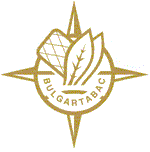 December 23, 2009 - Bulgaria's tobacco producers have asked for the transfer of Bulgartabac Holding from the economic to the agriculture ministry, Minister of Agriculture and Food Miroslav Naydenov has announced on Tuesday, December 22nd.
December 23, 2009 - Bulgaria's tobacco producers have asked for the transfer of Bulgartabac Holding from the economic to the agriculture ministry, Minister of Agriculture and Food Miroslav Naydenov has announced on Tuesday, December 22nd.
The producers explained that if the holding was managed by the agricultural ministry, their interests in a possible privatization of Bulgartabac would be better protected. "If the state share in the holding was 51%, the funds for of tobacco growers' premiums could have been secured, but there would be a risk that this could be considered by the EU as inadmissible state aid," Naydenov explained.
"It is high time to really understand what is happening there, and what has happened, and how the interests of the state are being protected," he commented, indirectly indicating that in the Tobacco Fund there were abuses that were currently under investigation.
Warnings of irregularities have come from the tobacco producers. "Maybe other colleagues should divulge this information," Naydenov said, alluding to the Interior Ministry.
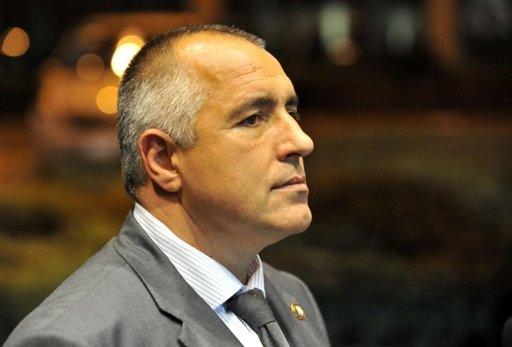 Prime Minister Boyko Borisov will bring together government ministers and the Executive Director and board of directors of Bulgartabac Holding, along with representatives of the tobacco producers, on December 29, to consider changing the status of the company.
Prime Minister Boyko Borisov will bring together government ministers and the Executive Director and board of directors of Bulgartabac Holding, along with representatives of the tobacco producers, on December 29, to consider changing the status of the company.
"If we decide that the right thing is to sell the holding, they will participate in all proceedings and, if it goes to the stage of selling it, to definitely ensure that if it is bought, what quantities of tobacco should be bought out in the coming years," Borisov said.
Reference: Tobacco Producers Propose Strategic Bulgartabac Transfer, Sofia Morning News - Novinite.com, 12/22/2009.
Bulgaria related news briefs:
Bulgaria - government, tobacco growers reach subsidy agreement..;
Bulgaria - start of steps leading to the privatization of the state-owned cigarette monopoly Bulgartabac..;
Bulgaria - police hold smoking protest over lack of bonuses..;
Bulgaria - police busts major cigarette contraband ring..;
Bulgaria - Bulgartabac Holding” will be privatized in 2010..;
Bulgaria - MPs Impose Hefty Fines on Cigarette Sales Violators..;
Bulgartabac Chief - cigarette tax increase as of January 1, 2010..;
Bulgaria Bulgartabac Holding Sells 23% of Shares to Mutual Funds..;
Bulgaria - more than 70% of smokers want to quit..;
Bulgaria - cigarette taxes going up each year except 2011..;
Bulgaria - chair of the economic committee in parliament disapproves of planned raise in excise duties on cigarettes..;
Bulgaria and others - smoking ban, increased cigarette taxes, smuggling..;
Bulgaria - Cigarette excise duties will be increased next year..;
Bulgaria - cigarette contraband, government loses BGN 920M yearly..;
Bulgaria - one third of the tobacco products sold are illicit..;
Bulgaria - new government to speed-up Bulgartabac sale..;
Bulgaria - Fake Victory Light cigarettes..;
Bulgaria's tobacco monopoly may be up for sale..;
Bulgarian lawmakers vote to ban smoking in all publc places from June 2010..; Bulgarian tobacco company Sofia-BT exports increase by 541 percent..;
Does Russia own Bulgaria's tobacco monopoly, Bulgartabac..;
EU percent of adults smokers -highest Greece 1 , Bulgaria 2.. - lowest Slovenia..;
Bulgaria - 1 in 3 youths smoke / half of pregnant women smoke..;
PMI training Bulgarian custom officers to stop cigarette smuggling..;
Philip Morris International (PMI) was truly happy they had been back in the Bulgarian cigarette market for a year and had already had 6.8% of market..;
WHO FCTC Protocol to Prevent Illicit Trade in Tobacco Products Won't Be Completed Until End of 2010..;
WHO Report on the Global Tobacco Epidemic 2008..;
Bulgaria Enters 2009 with Cigarette Prices Hike...
Bulgaria is marking Tuesday, November 10, 2009, the 20th year since the internal coup at the Bulgarian Communist Party which led to the crumbling of the communist regime..
Read more...
Bulgaria - government, tobacco growers reach subsidy agreement..
 December 23, 2009 - The Bulgarian government and the protesting tobacco growers have reached an agreement, and the protests will stop, following a meeting of the Council of Ministers and the Prime Minister.
December 23, 2009 - The Bulgarian government and the protesting tobacco growers have reached an agreement, and the protests will stop, following a meeting of the Council of Ministers and the Prime Minister.
Miroslav Naydenov, Minister of Agriculture, has announced on Tuesday that, he will request that payment of BGN 116 M in premiums to Bulgarian tobacco producers should be authorized for the 2009 crop, at the first meeting of the Council of Ministers of Agriculture on January 17, 2010.
Bulgaria is not one of the top 10 leading producers of tobacco leaf, 2007. Thirteen European Union (EU) member countries produce tobacco – with a few regions in Italy, Greece, Spain and Bulgaria being particularly active. The 27-member EU currently produces +/- 250,000 tons of raw tobacco annually, making it the world's fifth largest producer after China, the US, India and Brazil. EU production represents 5% of worldwide production. Italy is the biggest EU producer (36% of the 27 EU member countries' total production), followed by Poland (16%), Bulgaria (12%) and Spain (12%). Agricultural markets: Raw tobacco, Agriculture and Rural Development, European Commission).
By doing this, Bulgaria will request the opportunity to provide a one-off provision of state aid to the tobacco producers. This special request must be made because, as of 2010, sector subsidies in the EU will be ended. The premiums should be paid in 2009, but funds for this have not been allocated in the state budget.
Bulgaria has the right to grant BGN 116 M per year to assist its tobacco growers by permission of the European Union. In the spring of this year BGN 108 M had already been allocated.
Naydenov, Minister of Agriculture: “If we allocate to the tobacco producers more money than this sum, we will suffer sanctions by the European Commission, and they will have to return the money. In addition, they will lose the opportunity to apply for EU subsidies under the other programs for the next three years.” (Bulgaria Govt Can't Aid Tobacco Producers over EU Regulations, Novinite.com, 12/21/2009)
On March 29, 2010 at the earliest, a definitive decision will be taken by the Council of Ministers on Agriculture of the EU. "We hope that they will say okay and it will work, because such aid has been requested by other countries too. So let's hope that the aid will be authorized, and the moment we receive permission, we will begin to pay," the Minister explained.
According to Naydenov, the money will be found. "We will ask [Finance] Minister Dyankov," he said. "As of April 2010, it is likely the state can find funds – maybe, for example, temporarily from the Agriculture State Fund. Then, all EUR 116 M will be paid, assuming there is a positive response from the European Council," he explained.
Reference:
Bulgaria Government, Tobacco Growers Reach Subsidy Agreement, Sofia Morning News - Novinite.com, 12/22/2009.
Bulgaria related news briefs:
Bulgaria - start of steps leading to the privatization of the state-owned cigarette monopoly Bulgartabac..;
Bulgaria - police hold smoking protest over lack of bonuses..;
Bulgaria - police busts major cigarette contraband ring..;
Bulgaria - Bulgartabac Holding” will be privatized in 2010..;
Bulgaria - MPs Impose Hefty Fines on Cigarette Sales Violators..;
Bulgartabac Chief - cigarette tax increase as of January 1, 2010..;
Bulgaria Bulgartabac Holding Sells 23% of Shares to Mutual Funds..;
Bulgaria - more than 70% of smokers want to quit..;
Bulgaria - cigarette taxes going up each year except 2011..;
Bulgaria - chair of the economic committee in parliament disapproves of planned raise in excise duties on cigarettes..;
Bulgaria and others - smoking ban, increased cigarette taxes, smuggling..;
Bulgaria - Cigarette excise duties will be increased next year..;
Bulgaria - cigarette contraband, government loses BGN 920M yearly..;
Bulgaria - one third of the tobacco products sold are illicit..;
Bulgaria - new government to speed-up Bulgartabac sale..;
Bulgaria - Fake Victory Light cigarettes..;
Bulgaria's tobacco monopoly may be up for sale..;
Bulgarian lawmakers vote to ban smoking in all publc places from June 2010..; Bulgarian tobacco company Sofia-BT exports increase by 541 percent..;
Does Russia own Bulgaria's tobacco monopoly, Bulgartabac..;
EU percent of adults smokers -highest Greece 1 , Bulgaria 2.. - lowest Slovenia..;
Bulgaria - 1 in 3 youths smoke / half of pregnant women smoke..;
PMI training Bulgarian custom officers to stop cigarette smuggling..;
Philip Morris International (PMI) was truly happy they had been back in the Bulgarian cigarette market for a year and had already had 6.8% of market..;
WHO FCTC Protocol to Prevent Illicit Trade in Tobacco Products Won't Be Completed Until End of 2010..;
WHO Report on the Global Tobacco Epidemic 2008..;
Bulgaria Enters 2009 with Cigarette Prices Hike...
Bulgaria is marking Tuesday, November 10, 2009, the 20th year since the internal coup at the Bulgarian Communist Party which led to the crumbling of the communist regime..
Read more...
New Zealand - loophole in the law banning tobacco sponsorship..

 December 22, 2009 - Cigarette companies are being threatened with prosecution amid claims they are exploiting a loophole in the law banning tobacco sponsorship. The Smoke-Free Environments Act 1990 banned sponsorship by stopping companies from advertising and making financial contributions to events.
December 22, 2009 - Cigarette companies are being threatened with prosecution amid claims they are exploiting a loophole in the law banning tobacco sponsorship. The Smoke-Free Environments Act 1990 banned sponsorship by stopping companies from advertising and making financial contributions to events.
They appear to be getting around the law by paying for exclusive distribution deals with event promoters, including music festival Rhythm and Vines (29th Dec 2008 – 1st Jan 2009) and Air New Zealand Fashion Week September 21-26, 2009.
Rhythm and Vines director Scott Witters confirmed Philip Morris Tobacco had bought exclusive supply rights at this year's event, starting outside Gisborne on December 29, but wouldn't reveal how much.. Witters said the event approached the Health Sponsorship Council for Smokefree sponsorship before doing the deal, but "due to budgetary constraints they couldn't work with us".
He said having cigarettes onsite was part of "host responsibility" - to stop revelers driving 12km into the town centre to buy them. "It's no different to the agreements we have with a lot of other suppliers. They pay the rights so they don't get their competitors in there but there's no advertising, no promotion."
A spokeswoman for British American Tobacco New Zealand confirmed an exclusive supply deal with Fashion Week, held in September. The Herald on Sunday understands the company provided several marquees in exchange for the distribution rights. British American Tobacco and Myken Stewart of Fashion Week would not confirm this, but Stewart said the legislation allowed for "provision of equipment".
Philip Morris has also signed a deal with BW Camping Festival, which runs in conjunction with Rhythm and Vines. BW CAMPGROUNDS was born to help host the thousands of visitors venturing to the district for the Rhythm and Vines New Years Eve festival which just happens to be easily the dopest (font color=purple>cool, great, good) party of the year.
Festival organisers contacted the Gisborne Cancer Society requesting sponsorship in the form of sun shades and sunblock, but on learning of the tobacco company's involvement the society declined. Cancer Society health promotions manager Dr Jan Pearson: "There's absolutely no way we'd have anything to do with an event that is marketing tobacco to young people." BW Camping organisers did not return calls. The Health Ministry said tobacco companies who provided financial incentives to events were "most likely" breaking the law.
National tobacco control manager Karen Evison said the ministry had written to companies asking them to stop the practice voluntarily.
Michael Colhoun, of anti-smoking group ASH, said tobacco companies were trying to attract new customers, and called for retailers to be licensed in the same way as liquor sellers. "I could drive up and sell tobacco from the boot of my car as long as I pay the taxes. "Part of the frustrating thing ... is that unless you find a paper trail, you can't do a lot about it."
Reference: Cigarette companies find loophole in sponsorship laws by Alice Neville, nzherald.co.nz, 12/20/2009.
New Zealand related news briefs:
New Zealand - University of Auckland to go smokefree - 1st university in country..;
New Zealand - smoking ban in bars results in less smoking at home..;
New Zealand - study, tobacco displays leads to increase in youth smoking..;
New Zealand - graphic warnings cigarette maker selects less offensive images..;
New Zealand - Maori committee to investigate smoking..;
New Zealand - Tairawhiti Board wants tobacco sold only on prescription..;
New Zealand - health researchers calling on government to ban importation of tobacco..;
New Zealand - 1st trial ever of e-cigarettes..;
New Zealand - BAT reducing prices discouraging people from quitting..;
New Zealand - stop smoking campaigns NOT working..;
BAT awarded worst corporation in New Zealand..;
New Zealand - government may NOT support tobacco display bans..;
New Zealand More Evidence Needed to Ban Tobacco and Cigarette Displays..;
More evidence - tobacco displays increase the risk of teens smoking..;
Horror photos go on New Zealand cigarette packs..;
Country to Eliminate Smoking - The South Pacific nation of Niue;
Ireland to ban tobacco displays..;
Smokefree NZ within 10 years..;
By law, oral snuff cannot (but nasal snuff is allowed) be sold in New Zealand and can be imported only for personal use..
Read more...
Ghanaians - spend more on alcohol and tobacco than on food and other beverages..

 December 22, 2009 - Ghanaians spend 10.3 percent of their annual income on alcohol and tobacco, a survey has revealed. A mere 4.5 percent of annual earnings is spent on food and other beverages.
December 22, 2009 - Ghanaians spend 10.3 percent of their annual income on alcohol and tobacco, a survey has revealed. A mere 4.5 percent of annual earnings is spent on food and other beverages.
Prof. Kofi Awusabo Asare of the Department of Population and Health at the University of Cape Coast, gave the statistics when he delivered a public lecture organised by the Spiritan University College at Ejisu in the Ashanti Region.
According to Joy News’ Seth Kwame Boateng, the Professor expressed concern that only 3.9 percent of the country’s total earnings, according figures from the Ghana Statistical Service, was spent on food production, blaming what he called the worsening poverty situation on the little attention paid to issues relating to food production.
Prof. Asare was of the view that state intervention in reducing poverty will produce little if any results at all, if the situation is not reversed. Some parts of the country are reeling under what can best be described as debilitating poverty.
People of the Upper West Region for example are said to be swimming in a deep sea of misery and squalor as about 79 percent of them are extremely poor, statistics as of 2006 say.
That situation, Prof. Asare states, must be reversed calling on religious leaders to use their pulpits to preach and teach the concepts of saving to their followers.
Reference: Ghanaians spend twice more on alcohol, tobacco than on food, story by Malik Abass Daabu, Myjoyonline.com/Ghana, 12/20/2009.
Related news briefs:
Africa - the increase in tobacco use must be prevented..;
Ghana - Tobacco Control Bill to parliament this month, July 2009..;
Ghana to ban smoking in public places in November 2008..;
FCTC Member Ghana - NO Law Banning Sales of Tobacco to Minors..
British American Tobacco (BAT) - 100 years in Africa..
Read more...
Victoria, Australia - ban from smoking in cars when children under 18 are present comes into force January 1, 2010..

December 22, 2009 - Victoria gets tough on tobacco with new smoking ban. People will be banned from smoking in motor vehicles with children under 18 when new tobacco laws come into force on January 1, 2010.

Health Minister Daniel Andrews and  Quit Victoria Executive Director Fiona Sharkie today said the legal change would help protect children from exposure to second-hand cigarette smoke.
Quit Victoria Executive Director Fiona Sharkie today said the legal change would help protect children from exposure to second-hand cigarette smoke.
A recent survey found 4 in 10 smokers still light up around children.. This ban is part of the Victoria's tobacco control strategy announced on December 22, 2008. The ban on point-of-sale displays of cigarettes will be mandatory from [starting] January 2011. (Victoria, Australia 5-YR Tobacco Control Strategy.., 12/23/2008)
Mr. Andrews: “The Brumby Labor Government is taking action to reduce the impact of tobacco-related harm to the Victorian community, particularly among children. This new law will mean that no-one is allowed to smoke in a motor vehicle if a person under 18 is present. This ban includes whether the car is moving or not, whether the windows are open or closed, and whether the roof is down or not.”
The maximum penalty for an individual breaking the new law will be five penalty units ($584.10) with an infringement penalty (on the spot fine) of two penalty units ($233.64).
Mr Andrews said the law would encourage more parents to not smoke around children, and quit. “Research shows there is no risk-free level of second-hand smoke in confined areas such as cars, in fact the air quality when a person smokes in a car is similar to that of a smoky pub. Children exposed to second-hand smoke are at increased risk of premature death and disease, as well as reduced lung function, severe asthma, and increased risk of lower respiratory tract infections.”
Mr Andrews said that recent research by the Centre for Behavioural Research in Cancer at the  Cancer Council Victoria highlighted the need for this latest smoking ban. “This research shows that more than two-thirds of secondary school students said there was a ban on smoking in the family car when children were present,” he said. However, almost 20 per cent of those surveyed said that smoking was allowed with the window open, or there were no rules or restrictions on smoking in the car when children were present.
Cancer Council Victoria highlighted the need for this latest smoking ban. “This research shows that more than two-thirds of secondary school students said there was a ban on smoking in the family car when children were present,” he said. However, almost 20 per cent of those surveyed said that smoking was allowed with the window open, or there were no rules or restrictions on smoking in the car when children were present.
“The research also highlights that smoking habits and attitudes of parents greatly influence the likelihood of students picking up the habit.”
Mr Andrews said the new bans were part of the Brumby Government’s Victorian Tobacco Control Strategy 2008-2013 released last December. (Australia - Comments on the National Preventative Health Taskforce's Proposal..)
“The Government has set an ambitious target to reduce smoking in the adult population by 20 per cent, from 17.3 per cent to 13.8 per cent by 2013,” he said.
Reference: Victoria Gets Tough On Tobacco With New Smoking Ban In Cars, Source: Government of Victoria, 12/20/2009.
Victoria some related news brief:
Victoria, Australia - 4 in 10 smokers still light up around children..;
Victoria, Australia 5-YR Tobacco Control Strategy..;
State of Victoria Releases 5-Year Tobacco Control Strategy..;
Quit Victoria anti-smoking ad draws controversy..;
Australia - wants to move up date for fire-safe cigarettes..;
Australia - Victoria fires - arson thrown cigarette butt..;
Smoking Device has Quit fuming..;
Victoria May Outlaw Underage Smoking..;
Read more...
Australia - pokie (slot) machines revenue slowly recovery..
 Poker machine (slot machine) revenues are bouncing back as pub owners invest millions of dollars building outdoor areas to counter smoking bans.
Poker machine (slot machine) revenues are bouncing back as pub owners invest millions of dollars building outdoor areas to counter smoking bans.
CB Richard Ellis pubs director Joel Fisher said pub poker machine revenues in New South Wales (NSW) and Queensland were beginning to recover from total indoor smoking bans implemented in 2006 and 2007. Poker machine revenues, which slumped nationally from mid-2007, were now increasing, with pubs reporting gains of between 2 percent and 5 percent this calendar year, Mr Fisher said.
Mr Fisher: "A lot of pubs have built good outdoor smoking areas to cater for patrons who wish to smoke and play pokies. Different states had reported significant declines but in NSW and Queensland particularly, that really has turned the corner in the past few months."
A report by the federal government's Productivity Commission found that in the year to June the decline in poker machine spending across the nation had begun to ease, with some states showing a reversal.
In the year to June, both Queensland and Victoria recorded slight gains.
Last financial year in Victoria, $2.707 billion was pumped into poker machines, up a modest $12 million, while in Queensland pokies swallowed $1.861bn, up $3m. Mr Fisher said that although revenues had improved in many areas last financial year, the biggest improvements had been in the past six months.
The Crown Hotel in Sydney's Surry Hills recently spent $250,000 building an open smoking area inside the pub, where it has placed poker machines.
The pub's manager said the hotel was yet to see an increase in poker machine revenues following the renovations, but it had attracted a range of users.
He said some venues had seen dramatic rises in poker machine revenues, "while others are staying much the same. It depends on the demographic."
Mr Fisher said that under NSW smoking legalisation, pubs could build "outdoor" areas -- typically an area of the existing pub that had been sealed off and had open airflow -- where they could place poker machines.
In Queensland, the legislation specifically stated that patrons were not permitted to smoke while playing gaming machines, which meant many pubs had installed smoking areas next to gaming lounges.
Hotel groups such as the Australian Hotels Association lobbied heavily for the proliferation of poker machines in pubs, and numbers rocketed from the mid-1990s.
By 1999, after the Carr government approved pokies in pubs in NSW, Australia was home to 21 per cent of the world's gaming machines -- with just over half of them in NSW.
The values of pubs surged on the back of lucrative poker machine profits, and there was major consolidation in the sector.
Lobby groups subsequently campaigned strongly against the introduction of smoking bans, in a bid to protect those new poker machine revenue streams.
The approach of many pub and club operators has been criticised by social welfare and health advocates, who believe it is unethical for operators to exploit for financial gain a proven strong nexus between problem gambling and heavy smoking. According to the Productivity Commission's recently released draft report into gambling, almost half a million Australians are problem or "at risk" gamblers, and represent a quarter of all regular gamblers.
The money spent on poker machines now adds up to 65 per cent of all gambling revenues -- worth $11.8bn a year -- and 90 percent of that gambling takes place in pubs and clubs. The report said the number of poker machine gamblers had fallen slightly over the past two years, but those who continued to play the machines were spending more on them.
Reference: Outdoor smoke areas fire up pokie revenues, Anthony Klan, The Australian, 12/17/2009.
Read more...
Vietnam - national campaign launched calling for smoking ban..

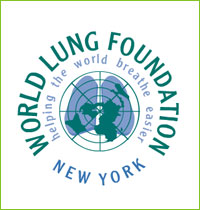 December 21, 2009 - The Vietnam Ministry of Health and the World Lung Foundation on December 18 launched a national campaign calling for a smoking ban in all public places.
December 21, 2009 - The Vietnam Ministry of Health and the World Lung Foundation on December 18 launched a national campaign calling for a smoking ban in all public places.
Back on August 26, 2009 we reported that starting from January 1, 2010 smoking in schools, hospitals, libraries, cinemas, factories, offices and on public transport will be prohibited. The ban will then extend to all indoor public spaces by the end of 2010, the statement said, adding the Vietnamese government also plans to apply "high tariff levels" on tobacco products next year to cut consumption. (Viet Nam - to ban smoking and increase tax..)
This national campaign includes two TV ads which will be broadcast in Vietnam for four weeks. Sandra Mullin, a representative from the World Lung Foundation, said that the images in the ads are very strong, which convey the massage [message] that smoking and breathing cigarette smoke is fatal and especially dangerous for children.
The Hanoi Medical University in April 2009 carried out research in three provinces, Thai Nguyen, Thua Thien – Hue and Vinh Long, about the implementation of the ban of smoking in public sites like rail and bus stations, airports, hospitals, schools, theatres and restaurants. This ban was issued four years ago. Officials from grassroots to central levels participated, along with 600 members of the public.
This is the premise for the project “For a Vietnam without cigarette smoke”.
The work shows that the ban is ineffective when both officials and people neglect this regulation. Restaurants and cafes have the heaviest concentration of smoke. Vietnam has a male smoking rate of 56 percent, one of the highest in the world.
“This ban is nearly ineffective. Actually, there is no smoking ban; just advice not to smoke in public sites. Even at my office, they don’t smoke partly thanks to their awareness and partly because the women complain,” said a representative from the National Assembly Committee for Social Issues. According to World Health Organisation figures, only two percent of women in Vietnam smoke.
Most of the 600 people said they didn’t know about the ban of smoking at cafes, restaurants or cinemas. Especially, none of people from Thua Thien – Hue province knew about this regulation.
The reason, according to researchers, is the lack of sanctions for those committing violalations [violations]. “It is simple because if one smokes, he will only be reminded or looked unsympathetically by others,” said an official.
People caught smoking in public places will receive fines beginning in January, the Ministry of Health has announced. Under the campaign, anyone caught smoking in public areas including schools, office buildings, theaters, cultural houses, factories, places vulnerable to fire and explosion, and public transport vehicles will be fined. The fines range from warnings to financial penalties of VND50,000-100,000 (USD 2.71 - 5.41). Inspectors from concerned agencies and People’s Committees in localities will administer the penalties.
References:
Ministry of Health calls for smoking ban in public places, Vietnamnet.vn/Health, 12/18/2009;
Smokers face fines in New Year, LookAtVietnam, 12/21/2009.
Vietnam - related news brief: Viet Nam - to ban smoking and increase tax...
Read more...
Bulgaria - start of steps leading to the privatization of the state-owned cigarette monopoly Bulgartabac..


December 21, 2009 -  Bulgaria’s Privatization Agency announced Friday, December 18th an open tender for selecting a consultant for the privatization of the state-owned cigarette monopoly Bulgartabac. “Bulgartabac Holding”. Map of Bulgaria..
Bulgaria’s Privatization Agency announced Friday, December 18th an open tender for selecting a consultant for the privatization of the state-owned cigarette monopoly Bulgartabac. “Bulgartabac Holding”. Map of Bulgaria..
The application forms costs BGN 2 000 (USD 1,461.28), and can be purchased within 35 days after the publication of the tender decision in the State Gazette. The deposit for participation in the tender is BGN 5 000 (USD 3,653.20), and must be transferred to the Privatization Agency account.
The deadline for submitting an application is 5:30 pm on the 40th day since the publication of the tender decision.
The requirements for the eligible candidates state that they should be international investment banks which are in the top 20 of the League Tables of Financial Advisers in 2007-2009 published by Merger Market or Thomson Reuters.
The candidates must be a leading a consultant of at least one privatization deal of a tobacco company in the last three years, and to have experience with privatization deals. In addition, they should be familiar with Bulgarian law, should have a team of proper legal and economics specialists, should not be in a legal dispute with the Bulgarian state, and should not be in liquidation.
Reference: Bulgaria Starts Privatization of Cigarette Monopoly Bulgartabac, Novinite.com (Sofia News Agency), 12/18/2009.
Bulgaria related news briefs:
Bulgaria - police hold smoking protest over lack of bonuses..;
Bulgaria - police busts major cigarette contraband ring..;
Bulgaria - Bulgartabac Holding” will be privatized in 2010..;
Bulgaria - MPs Impose Hefty Fines on Cigarette Sales Violators..;
Bulgartabac Chief - cigarette tax increase as of January 1, 2010..;
Bulgaria Bulgartabac Holding Sells 23% of Shares to Mutual Funds..;
Bulgaria - more than 70% of smokers want to quit..;
Bulgaria - cigarette taxes going up each year except 2011..;
Bulgaria - chair of the economic committee in parliament disapproves of planned raise in excise duties on cigarettes..;
Bulgaria and others - smoking ban, increased cigarette taxes, smuggling..;
Bulgaria - Cigarette excise duties will be increased next year..;
Bulgaria - cigarette contraband, government loses BGN 920M yearly..;
Bulgaria - one third of the tobacco products sold are illicit..;
Bulgaria - new government to speed-up Bulgartabac sale..;
Bulgaria - Fake Victory Light cigarettes..;
Bulgaria's tobacco monopoly may be up for sale..;
Bulgarian lawmakers vote to ban smoking in all publc places from June 2010..; Bulgarian tobacco company Sofia-BT exports increase by 541 percent..;
Does Russia own Bulgaria's tobacco monopoly, Bulgartabac..;
EU percent of adults smokers -highest Greece 1 , Bulgaria 2.. - lowest Slovenia..;
Bulgaria - 1 in 3 youths smoke / half of pregnant women smoke..;
PMI training Bulgarian custom officers to stop cigarette smuggling..;
Philip Morris International (PMI) was truly happy they had been back in the Bulgarian cigarette market for a year and had already had 6.8% of market..;
WHO FCTC Protocol to Prevent Illicit Trade in Tobacco Products Won't Be Completed Until End of 2010..;
WHO Report on the Global Tobacco Epidemic 2008..;
Bulgaria Enters 2009 with Cigarette Prices Hike...
Bulgaria is marking Tuesday, November 10, 2009, the 20th year since the internal coup at the Bulgarian Communist Party which led to the crumbling of the communist regime..
Read more...
Norway - starting January 1, 2010 - tobacco no longer on display..
Norway - Coat-of-Arms:

December 21, 2009 - From January 1st 2010, tobacco, snuff and other tobacco goods may no longer be displayed near the checkout point at Norwegian stores, but must be hidden under the counter.
The new ban will also affect tax free stores at Norwegian airports and on international ferries and ships registered in Norway.
The ban also includes chocolate cigarettes and liquorice (licorice) pipes.
-To prevent an evasion of the law, it will also be forbidden to display products that look like tobacco goods, says Health Directorate spokesperson Siri Nesheim.
In Norway by 1 July 2011 all cigarette packs shall carry a pictorial health warning. The new regulations will come into force 1 January 2010. Cigarettes must carry pictorial health warnings by 1 July 2011 at the latest, while other tobacco products must carry such warnings by 1 January 2012. (Pictorial health warnings on tobacco products, Norway Ministry of Health and Care Services, 10/12/2009.)
Reference: Tobacco no longer on display, The Norway Post, 12/21/2009.
Related news brief: Norway strict tobacco display ban by October 2009..
Read more...
Pakistan - implementation of tobacco control laws difficult..
Pakistan: Coat-of-Arms:
December 20, 2009 - ISLAMABAD - Many public offices and departments have no proper mechanism to implement tobacco control laws and to check its violation during duty hours. Citizens complained that due to this smokers openly use cigarettes which is clear violation of concerned laws that resulted harmful effects on non-smokers. They said according to concerned laws all public and work places have become smoke free therefore smokers should not be allowed smoking or using tobacco in their offices or public places, they demanded.
They said complete implementation of law will help protecting the health of non-smokers and make the smokers abiders [abide by] the concerned laws.
The government withdrawing Statutory Regulatory Order (SRO) on designated smoking areas had totally banned smoking in any place of public work to protect the health of non-smokers. (Pakistan - More, on rollback of the Statutory Regulatory Order on Designated Smoking Areas..)
It is pertinent to mention here that earlier, all public and private offices were allowed to designate a separate place for smokers to smoke within office premises with adequate arrangements to protect the health of non-smokers.
However, such permission was being misused as it had become practice that smokers were using places in offices other than designated areas while many offices had failed to allocate designated places for smokers.
The government has already declared some places of public work as no tobacco use places included hospitals, dispensaries, and other health care establishments, educational institutions, offices, conference rooms, all domestic flights, restaurants, buses, wagons, trains, indoor stadiums, gymnasiums, lounges of airports, waiting rooms at railway stations and waiting rooms at bus stations.
When contacted an official of Tobacco Control Cell, Ministry of Health said that SRO withdrawal will help cell to have strictly check on law violators with the help of public and concerned departments.
He said a five year strategic plan of action has been formed by the cell with focus on awareness programme for health officials, professionals, teachers, decision makers, administrative staffs etc..
Reference: Implementation of tobacco laws in public departments urged, Associated Press of Pakistan, 12/18/2009.
Pakistan - related news brief:
Pakistan - February, 2010 - graphic warnings on cigarette packs..;
Pakistan National Conference Tobacco Control, October 28th..;
Pakistan - pictorial health warnings on cigarette packs and cartons soon..;
Pakistan - More, on rollback of the Statutory Regulatory Order on Designated Smoking Areas..;
Smuggled Cigarettes Give Boost To Pakistani Militants..;
Pakistan - strong tobacco control measures..;
Pakistan - Government must withdraw Statutory Regulatory Order..;
Bloomberg Grant: Tobacco Reforms in Pakistan...
Read more...
Russia - tax on tobacco may be quadrupled..
State Duma Symbol.. 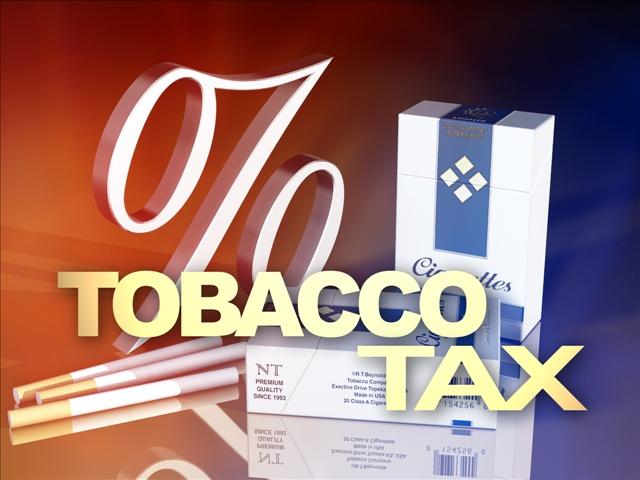 December 20, 2009 - The State Duma (the Duma in the Russian Empire and Russian Federation corresponds to the lower house of the parliament) may consider quadrupling tobacco excise instead of the 40 percent increase approved earlier, which could lead to the price of a packet of cigarettes doubling, Fontanka.ru (online newspaper) reported.
December 20, 2009 - The State Duma (the Duma in the Russian Empire and Russian Federation corresponds to the lower house of the parliament) may consider quadrupling tobacco excise instead of the 40 percent increase approved earlier, which could lead to the price of a packet of cigarettes doubling, Fontanka.ru (online newspaper) reported.
The Duma deputies hope the planned move will make more people quit smoking.
Tobacco producers say the excise increase will only have a negative effect on the transparency of the market, and will not influence the health of the population.
Deputies from the United Russia party, whose leader Boris Gryzlov is to head a commission on the issue, believes such actions could have a positive effect on people’s health.
The State Duma is currently discussing two options for a gradual increase in the excise. One option is to increase excise by 300 percent, the other by 400 percent. Under the latter option, the price of a packet of cigarettes would double in 2010. Deputies hope that the number of smokers in the country would significantly decrease as a result.
At the same time, deputies expect that a 400 percent increase in tobacco excise rates would provide the state budget with about 70 billion rubles ($2.28 billion.) The previously planned raise of 40 percent would bring in about another 10 billion rubles ($325 million,) Fontanka reported.
Tobacco producers said a significant increase in cigarette prices would cause a wave of indignation among customers and force some producers to start selling on the black market.
Nevo-Tabak tobacco producer said an excise increase in the current situation would not be constructive, Fontanka reported.
The company said that it would accept an increase in the VAT. Such a measure would be fair and would enable cheap cigarettes brands, which see a 20 to 25 percent loss in demand every year, to remain on the market, it said.
Anatoly Vereshchagin, communications director at JTI, said that JTI supports the well-balanced policy of the Russian government regarding gradual excise increases.
“Increasing excises by multiple times would increase the probability of illegal trade,” said Vereshchagin.
Smokers displayed mixed reactions to the news.
“I’ve been wanting to quit smoking for a long time, but my attempts to do so are not very successful,” said Artyom Zaitsev, 34, a manager. “So maybe an increase in cigarette prices would at least stop me from smoking as many cigarettes.”
Igor Zhmurin, 24, a student who said he smokes nearly two packets of cigarettes a day, said he would feel very negative about an increase in cigarette prices.
“I think higher prices would not stop me from smoking, but obviously someone would be getting more money from my pocket again,” Zhmurin said.
In November, the State Duma signed amendments to the Tax Code to increase the excise on beer and tobacco from 2010.
Tobacco production in Russia is concentrated mainly around Moscow and St. Petersburg. In St. Petersburg, two companies produce cigarettes — Philip Morris Izhora, a daughter company of Philip Morris International that produces 25 billion cigarettes a year; and Petro, the biggest factory of JT International that can produce up to 60 billion cigarettes a year.
Reference: Tax on Tobacco May Be Quadrupled by Irina Titova, The St. Petersburg Times, 12/18/2009.
Related news briefs:
Russia - tobacco epidemic with no solution in site..;
Russia - public health official discusses tobacco control..;
Russia - making it more difficult for servicemen to smoke..;
Russia - draft tobacco law being considered by Duma..;
Russia among top-10 smoking nations..;
Russian lawmakers discuss smoking ban for restaurants and bars..;
Russia passes new restrictions on tobacco..;
British American Tobacco (BAT) Misleading Russian Consumers..;
Russian State Duma (Parliament) ratified the framework convention of the World Health Organization (WHO) on tobacco control...
Read more...


To Provide Public Awareness
Purpose
About Us
Contact Us
2008 HIGHLIGHTS
TOPIX PAPERS - 2008 & 2009..
Archive
-
▼
2009 (1446)
-
▼
12/20 - 12/27 (24)
- Bangladesh - GATS - tobacco use among adults reac...
- PMI - proposed Japanese tobacco tax increase..
- Reynolds American - executive interview, Thomas Ad...
- Serbia - government abandons plans to introduce ...
- Macedonia - ban on smoking in public places takes ...
- Singapore - e-cigarettes are illegal..
- Star Scientifiic denied new trial in patent infrin...
- India - government set to ban foreign direct inves...
- Tanzania - call for public smoking areas..
- Japan Tobacco - reacts angrily to governments deci...
- Japan - tax increase, a pack of 20 cigarettes wil...
- Bulgaria - tobacco producers propose Bulgartabac ...
- Bulgaria - government, tobacco growers reach subsi...
- New Zealand - loophole in the law banning tobacco ...
- Ghanaians - spend more on alcohol and tobacco tha...
- Victoria, Australia - ban from smoking in cars whe...
- Australia - pokie (slot) machines revenue slowly...
- Vietnam - national campaign launched calling for ...
- Bulgaria - start of steps leading to the privatiza...
- Norway - starting January 1, 2010 - tobacco no lon...
- Pakistan - implementation of tobacco control laws...
- Russia - tax on tobacco may be quadrupled..
- Florida - campaign to encourage citizens to report...
- South Carolina - most residents support raising th...
-
▼
12/20 - 12/27 (24)